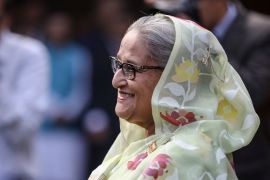Hasina's Party Excluded: Bangladesh Election Fallout

Table of Contents
The Unexpected Election Results and Their Impact
The Bangladesh election results defied nearly all pre-election predictions, marking a significant political upset. The unexpected victory of the opposition coalition sent shockwaves through the nation and beyond. Analyzing the election results provides crucial context for understanding the current crisis.
- Detailed breakdown of the election results: While precise figures may vary depending on the source, the opposition coalition secured a clear majority, surpassing the Awami League's vote share by a considerable margin. This margin of victory is significant and underscores the extent of the shift in public opinion.
- Analysis of the vote share: The Awami League's vote share experienced a dramatic decline compared to previous elections, indicating a significant loss of support among the electorate. Detailed analysis of regional variations in vote share will be crucial in understanding the underlying factors driving this change.
- Discussion on voter turnout: Voter turnout figures are also a key factor to consider. High turnout could signify strong public engagement, while low turnout might point to apathy or disenfranchisement. Analyzing voter turnout data across different demographics can provide valuable insights.
- Mention of irregularities or controversies: Allegations of irregularities and controversies surrounding the election process are emerging and require thorough investigation. These allegations, if substantiated, could further destabilize the political situation.
Political Instability and Potential for Crisis
The unexpected election results have heightened concerns about political instability and the potential for a significant political crisis in Bangladesh. The power transition presents several challenges.
- Assessment of the risk of political unrest: The potential for political unrest and violence following the election is a serious concern. Tensions between supporters of the opposing parties could easily escalate, demanding swift and decisive action from the relevant authorities.
- Analysis of the potential responses from the Awami League: The Awami League's response to its electoral defeat will be crucial in determining the stability of the transition. A peaceful and accepting response is vital to avoid further unrest.
- Discussion of the role of the military and other institutions: The role of the military and other key institutions in maintaining order and ensuring a smooth transition of power is paramount. Their neutrality and commitment to upholding democratic principles are critical.
- Exploration of potential scenarios for a power transition: Several scenarios are possible, ranging from a peaceful and orderly transition to prolonged instability. The capacity of the institutions to mediate and facilitate dialogue will shape the outcome.
Economic Consequences and International Relations
The election fallout extends beyond the immediate political sphere, impacting Bangladesh's economic outlook and its relations with the international community.
- Analysis of potential impacts on Bangladesh's economy: Uncertainty surrounding the election results could deter foreign investment and negatively impact economic growth. The new government's economic policies will be closely scrutinized by international investors.
- Discussion of the implications for relations with key international partners: Bangladesh's relationships with key international partners, including India and China, could be affected by the change in government. The new administration's foreign policy will need to navigate complex geopolitical dynamics.
- Exploration of the potential for sanctions or other international responses: Depending on the nature of the power transition and any allegations of irregularities, the international community may respond with sanctions or other measures.
- Assessment of the overall economic outlook: The economic outlook for Bangladesh under the new government is uncertain, with significant risks and opportunities present. The new administration's economic policies will play a crucial role in shaping this outlook.
The Role of Opposition Parties and Future Prospects
The success of the new government will hinge on the ability of the opposition parties to form a stable coalition and govern effectively.
- Profiling of the winning opposition party and its key figures: Understanding the winning party's ideology, policy platform, and key leadership figures is critical to predicting future political direction.
- Discussion of the potential for a coalition government and its stability: The stability of a coalition government, if formed, will depend on the ability of the participating parties to manage internal differences and maintain a cohesive governing agenda.
- Analysis of the likely policy changes: The new administration's policy priorities will likely differ from the Awami League, potentially leading to significant policy shifts in various sectors.
- Exploration of the outlook for future elections and political reforms: The outcome of this election raises questions about the future of the electoral process and the potential for political reforms.
Conclusion
The exclusion of Hasina's party from power marks a watershed moment in Bangladesh's political history. The election fallout presents significant challenges, including potential political instability, economic uncertainty, and the need to carefully navigate complex international relations. The ability of the new government to address these challenges and foster a stable and prosperous future will determine the long-term success of this transition. The long-term consequences of this election remain to be seen, but it's clear that Bangladesh's political landscape has undergone a dramatic shift. The upcoming period will be critical in determining the future direction of the country.
Call to Action: Stay informed about the evolving situation in Bangladesh and the ongoing implications of this pivotal election. Follow our updates on "Hasina's Party Excluded: Bangladesh Election Fallout" to stay abreast of the latest developments. Continue the discussion using #BangladeshElection #BangladeshPolitics.

Featured Posts
-
 San Jose Earthquakes Season Preview Analysis From Quakes Epicenter
May 16, 2025
San Jose Earthquakes Season Preview Analysis From Quakes Epicenter
May 16, 2025 -
 Anaheim Ducks Leo Carlsson Two Goals In Overtime Defeat Against Dallas Stars
May 16, 2025
Anaheim Ducks Leo Carlsson Two Goals In Overtime Defeat Against Dallas Stars
May 16, 2025 -
 Knicks Offensive Woes How Brunsons Return Might Not Solve Everything
May 16, 2025
Knicks Offensive Woes How Brunsons Return Might Not Solve Everything
May 16, 2025 -
 Urgent Action Needed Township Water Contamination
May 16, 2025
Urgent Action Needed Township Water Contamination
May 16, 2025 -
 The Impact Of Discriminatory Military Policies A Transgender Sergeants Story
May 16, 2025
The Impact Of Discriminatory Military Policies A Transgender Sergeants Story
May 16, 2025
